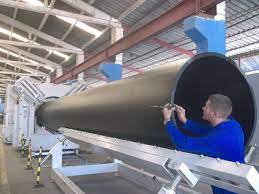Hydraulic works in the country and strategic sectors, such as agriculture, will have a guarantee this year for high-density polyethylene pipes and connections manufactured at the Ciegoplast Company, in Ciego de Ávila, the first of its kind in Cuba.

Arael Otero Sutil, main production specialist at Ciegoplast, exclusively informed the Cuban News Agency that the raw material plan to be processed in 2023 is 6,000 tons (t), higher than the 4,200 t that could be used the previous year, marked by energy deficit.
He pointed out that among the works that will benefit are those included in the Mariel development zone, in Artemisa; the Máximo Gómez and Nuevitas conductors, both of them in Camagüey, and those from Ciego de Ávila.
In the province of Ciego de Avila, continuity will be given to the Turiguanó-La Bandera conductor, with almost 30 kilometers of networks between the tank located at a high point in Turiguanó and the place known as La Bandera, south of Cayo Coco, in Jardines del Rey.
Once it will be completed, it will contribute 350 liters per second to the main tourist enclave of the territory.
Agriculture will be favored with pipes from 90 millimeters to 315 mm for the irrigation of water for various crops and fruit trees, the specialist said.
Belonging to Hydraulics Resources, the entity, founded 23 years ago, is in the group of companies that in the country focus on seeking profitability and satisfying the demands of the national market, without dismissing the incursion abroad.
Although there is still a long way to go, it is there that they direct their gaze, in addition, to promoting productive chains within the economy.
Its workers have been able to diversify what they do and reduce imports, even in the midst of difficulties exacerbated by the economic, commercial and financial blockade imposed by the United States government, and the COVID-19 pandemic.
To do this, they started up a mill that grinds all the waste from the main productions to use it in others, called alternatives, so that 100% of the high-density polyethylene is used.
The work is far-reaching, because most of these alternative creations, which substitute imports, do not require virgin raw material.
The manufacture of polyethylene fibers, a highly expensive product in the international market and which is used to cast the slabs of the transfer channels; cages for the intensive rearing of fish; and filter nozzles for water treatment plants are among these creations.
